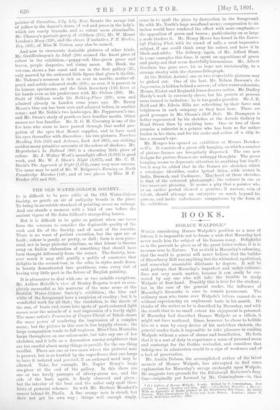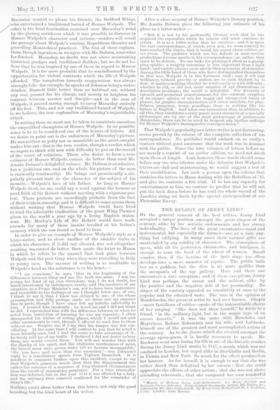BOOKS.
HORACE WALPOLE.*
WHILE considering Horace Walpole's position as a man of letters, it is impossible not to frame a wish that Macaulay had never made him the subject of his famous essay. Delightful as is the portrait he gives us of the great letter-writer, it is in no sense true to Nature. Yet so vivid is Macaulay's colouring,. that the, world in general will never believe that the builder. of Strawberry Hill was anything but the whimsical, egotisticall,, and somewhat unamiable dilettante he depicts. It will be. said, perhaps, that Macaulay's imperfect and unfair estimate, does not very much matter, because it can easily be cor,,. rected by any one who will take the trouble to study. Walpole at first-hand. Possibly this is true for the student ;: but in the case of the general reader, the influence of Macaulay's fireworks is sure to remain paramount. Tha ordinary man who turns over Walpole's letters cannot do so. without experiencing an unpleasant taste in his mouth. He thinks of the writer as be is described by Macaulay, and with the result that to no small extent his enjoyment is poisoned,. If Macaulay had described Horace Walpole as a villain, it might not have mattered. Since, however, he chose to belittle. him as a man by every device of his matchless rhetoric, the general reader finds it impossible to take pleasure in reading Walpole without a sense of shame and humiliation. He feels, that it is a sort of duty to. experience a sense of personal scorn and contenipt for the Gothic revivalist, and considers that indulgence in admiration would be a sign of weakness and of- a lack of penetration.
Mr. Austin Dobson, the accomplished author of the latest memoir of Horace Walpole, has attempted to find some. explanation for Macaulay's savage onslaught upon Walpole. He suggests two grounds for the Edinburgh Reviewer's fury. One—originally put forward by Mr. Cunningham—is, that * (1.) Letters of Horace Wa1polo. D vols. Edited by P. Cunningham, New edition. London: Bentley and Soil. 1891.—(2.) Horace Walpole a Memoir. With an Appendix of Books printed at the Strawberry Hill Prose. By Austin Dobson. With Illustrations by Percy and Lcion Moran. London : James Osgood, MeIlvaine, mid Co. 1890.
Macaulay wanted to please his friends, the Bedford Whigs, whO entertained a traditional hatred of Horace Walpole. The ' other is the fatal fascination exercised over Macaulay's mind / by the glaring antitheses which it was possible to discover in Horace Walpole's character and actions,—readers will recall the passage about Walpole's soaring Republican theories and grovelling Monarchical practices. The first of these explana- tions, though ingenious, is, we agree with Mr. Dobson, somewhat far-fetched. Macaulay, no doubt, was not above maintaining historical grudges and traditional dislikes ; but we do not be- lieve that he was inspired by one of these in regard to Horace Walpole. It is far more probable that lie was influenced by the opportunities for violent contrasts which the life of Walpole afforded. The temptation towards exaggeration was always strongly felt—for example, he speaks of Johnson being a water- drinker, Boswell little better than an habitual sot, without any real ground for his charge, and merely to heighten his contrast between master and disciple—and in the case of Walpole, it proved strong enough to carry Macaulay entirely off his feet. This, and not any traditional hatred of Walpole, is, we believe, the true explanation of Macaulay's unjustifiable attack.
In writing thus, we must not be taken to constitute ourselves the unqualified champions of Horace Walpole. In no possible sense is he to be considered one of the heroes of letters. All we desire to point out is the unfairness of Macaulay's picture. He was neither so petty nor so unamiable as the great essayist makes him out ; that is the true verdict, though a verdict which we regret to think will now with difficulty be put on the record of the court of criticism. Those who desire to form a true estimate of Horace Walpole, cannot do better than read Mr. Austin Dobson's delightful volume. Mr. Dobson is an admirer, but a judicious one, and on the whole, his picture of the man is eminently trustworthy. He brings out prominently a sin- gularly pleasant trait in the character of the subject of his memoir,—Walpole's love of his father. As long as Horace Walpole lived, no one could say a word against the honour or good faith of Sir Robert without meeting with a vigorous pro- test. These protests are exceedingly pathetic from the fact of their evident sincerity, and it is difficult to come across them without wishing that Horace Walpole could have lived to read the admirable vindication of the great Whig Premier given to the world a year ago by a living English states- man. Mr. Morley's Life of Sir Robert would have made amends for many of those insults levelled at his father's memory which the son found so hard to bear. In order to give an example of Horace Walpole's style as a letter-writer, and to show another of the amiable traits in which his character, if it did not abound, was not altogether wanting, we, cannot do better than quote the letter to Mason in which he refers to the quarrel that took place between Walpole and the poet Gray when they were travelling in Italy as young men. The manner of writing is as creditable to Walpole's head as the substance is to his heart :— " ' I am conscious,' he says, 'that in the beginning of the differences between Gray and me, the fault was mine. I was too young, too fond of my own diversions, nay, I do not doubt, too much intoxicated by indulgence, vanity, and the insolence of my situation, as a Prime Minister's son, not to have been inattentive and insensible to the feelings of one I thought below me ; of ono, I blush to say it, that I knew was obliged to me ; of one whom presumption and folly perhaps made me deem not my superior then in parts, though I have since felt my infinite inferiority to him. I treated him insolently : he loved me and I did not think he did. I reproached him with the difference between us when he acted from conviction of knowing he was my superior; I often disregarded his wishes of seeing places, which 1 would not quit other amusements to visit, though I offered to send him to them without Inc. Forgive me, if I say that his temper was not con- ciliating. At the same tune I will confess to you that he acted a more friendly part, had I had the Ben's() to take advantage of it ; he freely told me of my faults. I declared I did not desire to hear them, nor would correct them. You will not wonder that with the dignity of his spirit, and the obstinate carelessness of mine, the breach must have grown wider till we became incompatible.' 'Sir, you have said more than was necessary,'—was Johnson's reply to a conciliatory speech from Topham I3eauclerk. It is needless to comment further upon this incident, except to say that Walpole's generous words show that the disagreement was rather the outcome of a sequence of long-strained circumstances than the result of momentary petulance. For a time reconcilia- tion was deferred, but in the year 1744 it was effected by a lady, and the intimacy thus renewed continued for the remainder of Gray's life."
Nothing could show better than this letter, not only the good breeding but the kind heart of the writer. After a clear ac3ount of Horace Walpole's literary position, Mr. Austin Dobson gives the following just estimate of hia place as a letter-writer :—
" But it is not by his professedly literary work that lie has acquired the reputation which he retains and must continue to retain. It is as a letter-writer that be survives ; and it is upon the vast correspondence, of which, even now, we seem scarcely to. have reached the limits, that is based his surest claim vottitare per ova rtirum. The qualities which are his defects in more serious productions become merits in his correspondence; or, rather, they cease to be defects. No one looks for prolonged effort in a gossip- ping epistle ; a weighty reasoning is less important than a light hand ; and variety pleases more surely than symmetry of structure. Among the little band of those who have distinguished themselves in this way, Walpole is in the foremost rank ; nay, if wit and brilliancy, without gravity or pathos, are to rank highest, he ia first. It matters nothing whether he wrote easily or with difficulty ; whether ho did, or did not, make minutes of apt illustrations or descriptive incidents ; the result is delightful. For diversity of interest and perpetual entertainment, for the constant surprises of an unique species of wit, for happy and unexpected turns of phrase; for graphic characterisation and clever anecdote, for play- fulness, pungency, irony, persiflage, there is nothing like his letters in English. And when one remembers that, in addition to. all this, they constitute a sixty years' social chronicle of a specially picturesque era by one of the most picturesque of picturesque chroniclers, there can be no need to bespeak any further suffrage for Horace Walpole's incomparable correspondence."
That Walpole's popularity as a letter-writer is not decreasing, seems proved by the reissue of the complete collection of his correspondence. No publisher would embark on so costly a venture without good assurance that the work was in demand with the public. Since the nine volumes of letters before us are merely a reprint of an earlier edition, we need not dwell upon them at length. Lest, however, these words should come before any one who labours under the delusion that Walpole's. letters arc dull and uninteresting, we would suggest a test of their readableness. Let such a person open the volume that contains the letters to Mann dealing with the Rebellion of '45, and give its contents a fair trial, If he has any capacity for
entertainment in him, we venture to predict that he will not put the book down before he has read the whole record of the Jacobite rising set forth by the special correspondent of our Florentine Envoy.







































 Previous page
Previous page